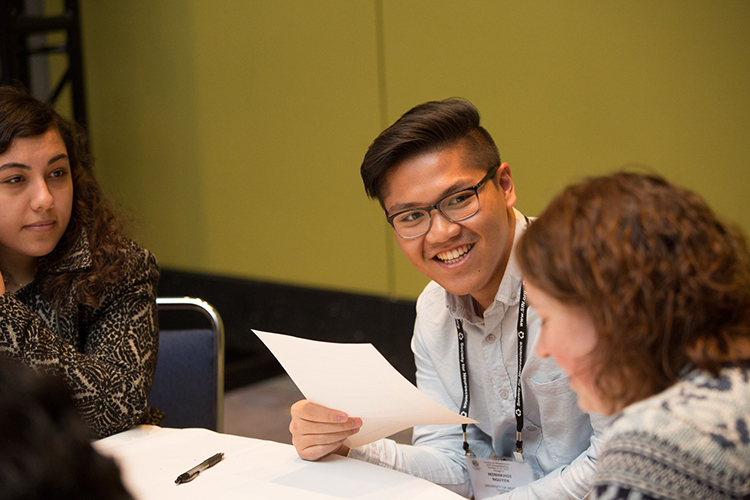
Q&A: IBRO Secretary-General Discusses Efforts to Advance the Field

Larry Swanson is secretary-general of the International Brain Research Organization (IBRO), a former SfN president (2012-13), and a professor of neurology and psychology at the University of Southern California.
As the IBRO secretary-general, what are your priorities for your time in office and what initiatives or programs are underway to fulfill them?
As the current IBRO secretary-general, my priorities are to reinforce successful IBRO initiatives and programs, and to invest resources in future alliances and activities that promote the global growth of neuroscience. Very fortunately, I have inherited a legacy of strong, long-established programs and activities, so I will help to maintain and further advance the resulting work of my predecessors, including the Return Home and joint IBRO/International Society for Neurochemistry (ISN) postdoctoral research fellowship programs, the Latin American Training Program with SfN and the Grass Foundation, and our international travel and regional grants that support schools, short courses, workshops, exchanges, and symposia around the world.
I will also contribute to the further development of more recent initiatives, such as the African Centers for Advanced Training in Neuroscience in Morocco and South Africa, the CAJAL Advanced Neuroscience Training Programme with the Federation of European Neuroscience Societies (FENS) in Bordeaux and Lisbon, and the IBRO Global Advocacy Initiative, which was established as a joint effort between IBRO, SfN, FENS, the Dana Foundation, the Japan Neuroscience Society, the Australasian Neuroscience Society, and ISN.
A new initiative that I have been directly involved in developing this year is the IBRO Science of Learning Initiative. It was launched with the International Bureau of Education (IBE), a part of UNESCO based in Geneva. Five IBRO/IBE-UNESCO fellowships have already been awarded to international researchers who, we hope, will help increase recognition of basic neuroscience research as crucial to increasing our understanding of how the human brain learns at all stages of life. The objective is to inform education practitioners, policymakers, and governments about how this knowledge can help address a broad range of issues related to mass migrations, equitable development, and achieving more effective learning.
Can you describe the work and the goals of IBRO’s Global Advocacy Committee? How can individual neuroscientists join in efforts around the globe to advocate for science?
The IBRO Global Advocacy Committee is committed to the collaborative promotion of neuroscience through culturally and regionally relevant advocacy programs, with a focus on Africa, Asia, and Latin America. The work has already included three major workshops in these regions to identify at the outset their specific advocacy needs, as well as regional seed grant awards to support locally organized activities that increase awareness about the brain and help gain more support for basic research from policymakers, the public, and investors.
Individual neuroscientists can join in efforts around the world by working with other colleagues and their local neuroscience societies and research institutes to create informal and formal advisory structures or networks that facilitate open dialogue and knowledge exchange between neuroscientists, the public, policymakers, investors, and other stakeholder groups whose lives would directly benefit from advancements in brain research. Everyone, in fact, is affected in one way or another and could benefit from increased understanding and support of neuroscience research. This point has to be made absolutely clear by any neuroscience advocate.
What do you see as the primary challenges facing the field of neuroscience and how can organizations such as IBRO and SfN address those challenges?
Some of the most obvious challenges include accessibility and inclusiveness of neuroscience research — increasing support of researchers from disadvantaged regions or social groups; translating and visualizing research understandable to the public; supporting open-access research and data; and advocating through online tools and public events.
Another challenge revolves around political, economic, and environmental instability in many regions of the world. We must help direct resources toward establishing and developing sustainable infrastructure, programs, and research communities; advocating for neuroscience with decision-makers and leaders of academia, industry, and government; and providing opportunities for researchers from unstable areas to study and train abroad.
Coordination, standardization, and application of big data and big brain projects is also important. We need to participate actively in related discussions, collaborations, and meetings or conferences; to support research projects based on collaboration, partnership, and sharing and standardization of data; and to provide forums for dialogue and interaction at our own meetings and conferences.
And last but certainly not least, there is the challenge to increase support for basic neuroscience research, with encouragement and support for nonhuman (including primate) work. Strategies here would include issuing joint statements emphasizing the continuing need for basic human and nonhuman research, and articulating and disseminating the benefits of basic research to the public and to policymakers.
What is IBRO doing to support trainees and encourage future generations of neuroscientists?
Most of our programs provide training and support for young researchers in order to build future generations of neuroscientists. These programs especially focus on enabling and encouraging researchers from countries with greater challenges and limited resources that can block the growth of research and training.
For instance, our Return Home fellowships allow neuroscientists to go back to their own countries and set up labs and research teams that will generate research and training at local and regional levels. Our travel grants and research and exchange fellowships allow awardees to gain outside mentoring and training experience as well as networking opportunities essential to creating, sustaining, and building relevant and quality research. Our regional committees also offer diversity grants to create more equitable research, mentoring, and networking opportunities for historically underprivileged groups in the field.
Actually, all of our work can be described as supporting trainees and encouraging future neuroscientists in one way or another. Supporting schools, conferences, teaching tools workshops, symposia, lecturer exchanges, short stays, short courses — they all aim to produce highly trained researchers and to ensure an enduring future for neuroscience and neuroscientists around the world.
What are some of the best ways that organizations like IBRO and SfN can promote neuroscience in the public sphere?
- Utilize social media and other online communication tools and educational platforms to reach global audiences.
- Integrate free public awareness and advocacy activities at conferences, meetings, and even schools.
- Engage and collaborate with artists, musicians, athletes, actors, gamers, or any others from different fields who are able to communicate complex brain research to the public through alternative and sometimes quite effective venues.
- Fund outreach and advocacy activities at the local and regional levels tailored to the needs and interests of specific communities.
- Support, encourage, and maintain high standards for open-access research and information.























